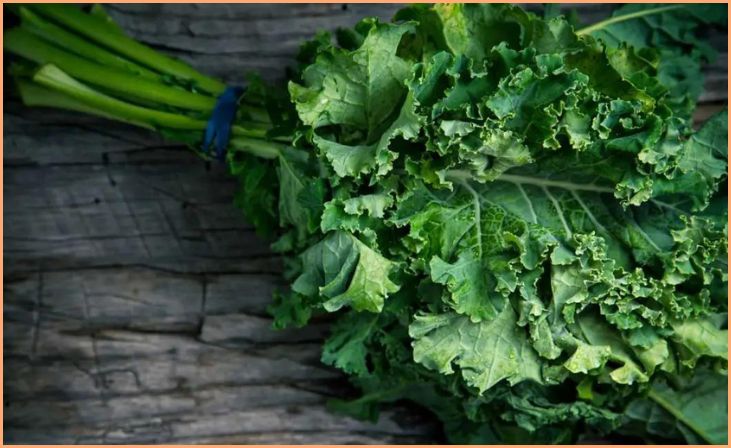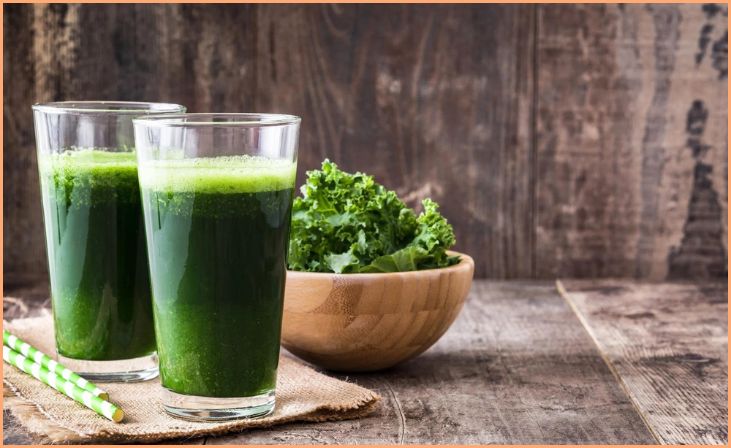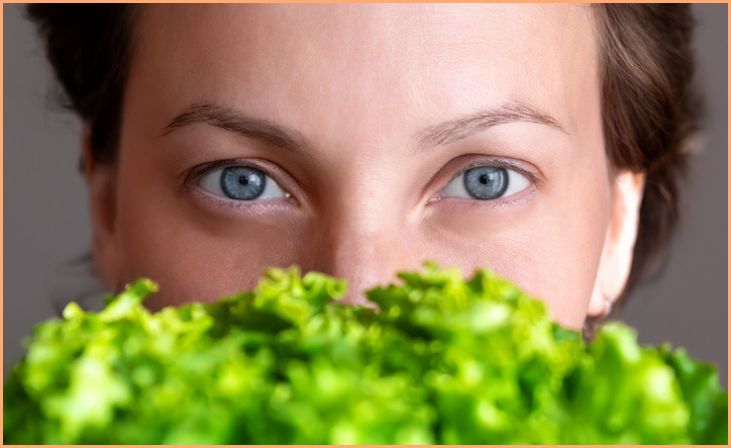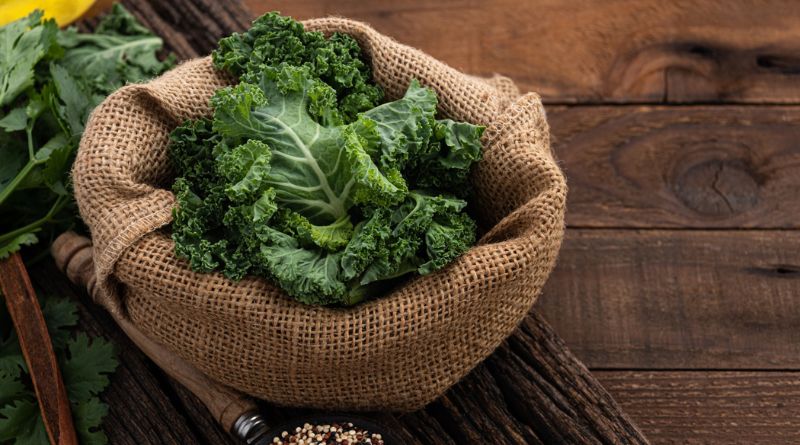Top 10 Health Benefits of Kale
In the world of leafy greens, kale stands as a nutritional powerhouse, celebrated for its myriad health benefits and versatility. As we embark on a journey to uncover the secrets behind this vibrant cruciferous vegetable, join us in exploring the “Top 10 Health Benefits of Kale.” From its dense nutrient profile and antioxidant richness to its potential in promoting heart health and aiding digestion, kale emerges as a culinary gem that transcends mere trend to become a staple in a wellness-centric lifestyle.
Discover the science-backed advantages that make kale a green giant in nourishing our bodies and supporting overall well-being. So, let’s dive into the leafy allure of kale and embrace its nutritional bounty for a healthier and more vibrant life.
Health Benefits of Kale
Unlock the nutritional wonders of kale with our exploration of its ‘Top 10 Health Benefits of Kale.’ From supporting heart health to boosting immunity, discover the green magic that makes kale a superfood sensation for your overall well-being. Dive into the leafy goodness and embrace the kale revolution!
1. Rich in Nutrients

Kale stands as a nutritional powerhouse, earning its reputation as one of the most nutrient-dense foods available. Bursting with vitamins and minerals, including vitamin K, vitamin C, potassium, and calcium, kale provides a concentrated dose of essential nutrients in each vibrant leaf. Its rich nutrient profile contributes to bone health, immune support, and overall vitality.
Additionally, kale is a fantastic source of antioxidants like beta-carotene and quercetin, helping combat oxidative stress and inflammation in the body. Including kale in your diet ensures you’re not just satisfying hunger but also nourishing your body with a wide array of vital nutrients, making it a versatile and health-promoting addition to any well-balanced diet.
For More- Customers’ Honest Opinions: 7 Overpriced Fast-Food Chains
2. High in Antioxidants
Kale’s vibrant green leaves are a treasure trove of antioxidants, making it a superhero in the fight against oxidative stress and inflammation. Packed with compounds like flavonoids, polyphenols, and carotenoids, kale provides a robust defense against free radicals that can damage cells. The high antioxidant content, including beta-carotene and vitamin C, not only supports the body’s natural detoxification processes but also promotes skin health and may reduce the risk of chronic diseases.
Incorporating kale into your diet offers a delicious and nutrient-rich way to harness the power of antioxidants, helping your body maintain balance and resilience in the face of environmental and internal stressors. Make kale a regular part of your meals to enjoy the protective benefits of these antioxidants and contribute to the overall well-being of your body.
3. Anti-Inflammatory Properties

Kale boasts remarkable anti-inflammatory properties, making it a valuable addition to a health-conscious diet. Rich in compounds like glucosinolates and flavonoids, kale helps mitigate chronic inflammation, a root cause of many health issues. These anti-inflammatory properties extend to the omega-3 fatty acids found in kale, specifically alpha-linolenic acid (ALA), which contributes to reducing inflammation at the cellular level. Including kale in your meals supports the body’s ability to combat inflammation, promoting joint health, cardiovascular well-being, and overall systemic balance.
Embracing kale as a dietary staple offers a delicious and nutritious way to proactively manage inflammation, contributing to long-term health and a lowered risk of inflammatory-related conditions.
4. Cholesterol-lowering potential
Kale demonstrates impressive cholesterol-lowering potential, making it a heart-healthy addition to your diet. The fiber content, particularly soluble fiber, in kale helps to reduce levels of LDL (low-density lipoprotein) cholesterol—the “bad” cholesterol—in the bloodstream. This soluble fiber binds to cholesterol molecules, aiding in their removal from the body and preventing their absorption.
Additionally, kale contains compounds like plant sterols, which further contribute to lowering cholesterol. By incorporating kale into your meals, you support a natural and delicious way to manage cholesterol levels, promoting cardiovascular health and reducing the risk of heart-related issues. Whether sautéed, blended into smoothies, or added to salads, enjoying kale regularly is a flavorful strategy to nourish your heart and keep your cholesterol levels in check.
5. Improved Digestion
Kale contributes to improved digestion, thanks to its rich fiber content and digestive-friendly properties. The fiber in kale promotes regular bowel movements, preventing constipation and supporting a healthy digestive system. Additionally, kale contains enzymes that aid in the digestion of certain foods, enhancing nutrient absorption in the process. The combination of fiber and digestive enzymes makes kale a valuable addition to a well-rounded diet, promoting gut health and regularity.
Whether enjoyed in salads, sautés, or smoothies, incorporating kale ensures that you’re not only savoring its delicious taste but also nurturing your digestive well-being. Embrace kale as a flavorful and nutrient-packed choice to support a happy and healthy digestive system.
6. Healthy Eyes

Kale plays a crucial role in promoting healthy eyes and supporting vision due to its rich content of essential nutrients. Loaded with lutein and zeaxanthin, antioxidants that belong to the carotenoid family, kale contributes to reducing the risk of age-related macular degeneration (AMD) and cataracts. These compounds protect the eyes from harmful high-energy light waves like ultraviolet rays.
By incorporating kale into your diet, you provide your eyes with the necessary nutrients to maintain optimal function and protect against oxidative stress. Whether incorporated into salads, stir-fries, or smoothies, enjoying kale regularly is a tasty way to nourish your eyes and safeguard your vision for the long term.
7. Reduced Cancer Risk
Kale emerges as a formidable ally in reducing the risk of cancer, thanks to its potent array of antioxidants and anti-cancer compounds. High levels of glucosinolates, found in cruciferous vegetables like kale, are known for their ability to combat the development of cancer cells. The sulforaphane produced when glucosinolates are broken down in the body exhibits powerful anti-cancer properties, targeting and inhibiting the growth of cancer cells.
Additionally, the wealth of antioxidants in kale, including vitamin C and beta-carotene, helps neutralize free radicals that can contribute to cancer development. By incorporating kale into your diet, you harness its cancer-fighting potential, contributing to a proactive and flavorful approach to reducing the risk of various types of cancers.
8. Weight Loss Support
Kale serves as a valuable ally in weight loss efforts, offering a nutrient-dense and low-calorie option for those aiming to shed pounds. The high fiber content in kale promotes a feeling of fullness, helping to control appetite and reduce overall calorie intake. Additionally, the low energy density of kale means you can consume a satisfying volume of food with fewer calories, supporting weight management goals. The presence of nutrients like vitamins, minerals, and antioxidants in kale ensures that, despite being low in calories, it provides essential nourishment for overall well-being.
Whether enjoyed in salads, smoothies, or as a side dish, incorporating kale into your diet contributes to a nutritious and flavorful weight loss journey, making it a delicious and health-conscious choice for those seeking to achieve and maintain a healthy weight.
9. Strong Bones and Teeth
Kale emerges as a natural supporter of strong bones and teeth, thanks to its impressive array of bone-building nutrients. Abundant in calcium, magnesium, and vitamin K, kale provides the essential building blocks for maintaining bone density and strength. Calcium is crucial for bone structure, magnesium aids in calcium absorption, and vitamin K plays a role in bone mineralization.
These combined nutrients not only contribute to bone health but also support dental wellness by promoting the integrity of teeth. Incorporating kale into your diet, whether in salads, soups, or as a side dish, ensures you’re fortifying your skeletal system and promoting the longevity of both bones and teeth for overall health and vitality.
10. Versatile and Easy to Include in Your Diet

One of kale’s standout qualities is its versatility and ease of inclusion in a variety of dishes, making it a highly accessible and enjoyable addition to your diet. Whether tossed into salads for a refreshing crunch, blended into smoothies for a nutrient-packed boost, or sautéed as a savory side, kale effortlessly adapts to different culinary creations. Its mild flavor profile allows it to complement a wide range of ingredients, enhancing both the taste and nutritional value of your meals.
With minimal preparation required, kale stands out as a convenient choice for those seeking to elevate their diet with a nutrient-dense and flavorful green. Embrace the simplicity and adaptability of kale, ensuring that you can effortlessly enjoy its health benefits in various delicious ways.
Also Read- 10 Best Healthy Late-Night Snacks
Final Words
In the world of leafy greens, kale stands tall as a nutritional powerhouse, offering a kaleidoscope of health benefits that make it a must-have in your culinary arsenal. From its robust nutrient profile to its role in supporting heart health, digestion, and even reducing cancer risk, kale proves that health-conscious choices can be both delicious and versatile. As we conclude our exploration of the “Top 10 Health Benefits of Kale,” let the vibrant green leaves of this cruciferous superstar inspire you to embrace a wholesome and nourishing lifestyle. Whether tossed into salads, blended into smoothies, or incorporated into various dishes, kale is a versatile green that brings both flavor and wellness to the table.
FAQs
Both! Kale can be enjoyed raw in salads or cooked in various dishes, offering different textures and flavors.
Aim for a few servings per week to enjoy a consistent influx of kale’s nutritional advantages.
Yes, kale can be frozen for later use, especially in smoothies or cooked dishes.




